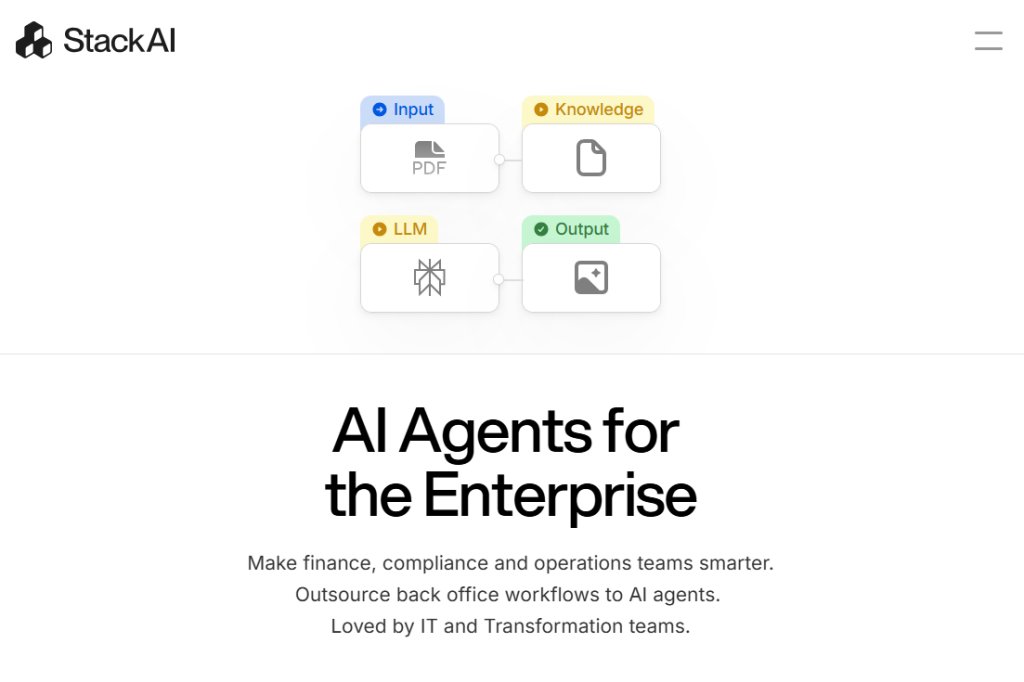
In a significant milestone for the enterprise AI space, StackAI, a rising star in no-code AI agent infrastructure, has successfully raised $16 million in Series A funding. This funding round, which includes investors such as Lobby VC, LifeX Ventures, Guillermo Rauch, Bob van Luijt, Gradient, Epakon Capital, and the ever-influential Y Combinator, marks a powerful vote of confidence in StackAI’s mission: to make deploying AI agents as simple as clicking “launch.”
Founded with the belief that enterprises shouldn’t need PhDs to integrate AI, StackAI is building a platform that empowers teams to deploy large language model (LLM)-powered agents with modular, enterprise-grade components. The raise is co-led by founder Bernard Aceituno, and comes at a time when organizations are scrambling to infuse intelligence into legacy workflows without bloating dev cycles.
What StackAI Is Doing Differently
At its core, StackAI abstracts the complexity of LLM-based systems. From input pipelines to knowledge graphs and output delivery, the platform provides a visual, no-code interface that orchestrates end-to-end AI workflows.
But more critically, StackAI isn’t just another chatbot builder. It provides:
- Context-aware memory modules
- API-first architecture for scaling
- Knowledge base integrations (internal wikis, Notion, SharePoint, etc.)
- Security layers for enterprise compliance
- Pluggable LLM options (OpenAI, Anthropic, Mistral, etc.)
This architecture means that businesses can launch fully autonomous agents in hours - not weeks - and tailor each one to precise internal use cases like HR ticketing, internal tech support, product documentation querying, and even complex decision trees in procurement.
The Silent Struggle Inside Enterprises
Here's the thing most investors don't hear: enterprise adoption of AI has less to do with technology and more to do with inertia and risk aversion. IT teams are often overloaded, AI teams are understaffed, and legal departments are wary of privacy breaches with public models. This leads to innovation stalls, even when the upside is obvious.
StackAI's real unlock is not the AI - it’s the abstraction of integration. That single insight is what separates them from most competitors who are still selling “AI” instead of “ease.”
Now, Here's Where Founders Should Pay Attention
Midway through the story of StackAI lies something that every founder in this space should deeply understand: distribution precedes innovation.
No matter how groundbreaking your AI is, if your users can’t implement it easily, they won’t. StackAI understood that and designed their product with deployment as Day 0 - not an afterthought. This principle can be extended to any AI SaaS startup: build backwards from your user's limitations, not your technical vision.
StackAI’s traction is owed not just to a clever product, but to a ruthless focus on go-to-market friction. They’ve partnered with CTOs in the first week, built internal champions, and streamlined sandbox testing to happen in under 30 minutes. That’s the level of operational precision that turns a tech product into a scalable company.
And for any founder reading this, here’s the hard truth: if your product requires a demo to explain, you’re already losing. StackAI’s UX does the selling - the AI does the magic.
Why This Market Is Heating Up
The enterprise AI agent market is surging. According to Gartner, by 2026 over 60% of enterprises will have deployed at least one AI agent into core business functions, up from just 12% in 2023. This creates a massive opportunity for platforms like StackAI that lower the barrier to entry.
Further, IDC predicts the enterprise AI software market will hit $125 billion by 2027, growing at a CAGR of 29%. With companies like Microsoft embedding Copilot into Office Suite and Salesforce going all-in on AI-driven CRM experiences, the race is on for full-stack solutions that integrate, personalize, and autonomously reason across disparate knowledge systems.
StackAI’s competitive advantage lies in being model-agnostic, modular, and privacy-first - three attributes that large enterprises now demand. Additionally, as LLM providers become commoditized, it’s the orchestration layer (where StackAI operates) that will define defensibility.
Final Thoughts: The Next AI Agent Layer
With this $16M injection, StackAI is well-positioned to push beyond simple bots and into multi-agent collaboration ecosystems - think of AI agents that can talk to each other, handle tasks in parallel, and autonomously resolve logic trees across departments.
Their roadmap hints at workflow-aware agents, secure on-prem deployment, and even agent auditability, which could become regulatory requirements in sectors like healthcare and finance.
In short: StackAI isn't just solving a current pain point - it’s building toward the future operating system of enterprise intelligence.









